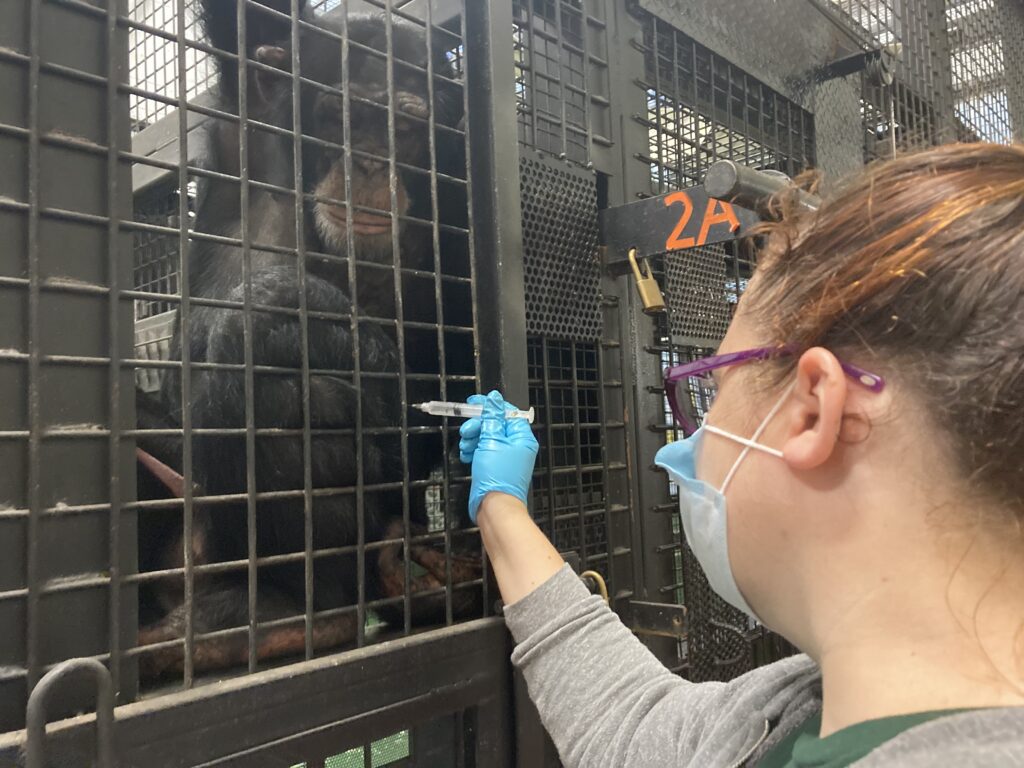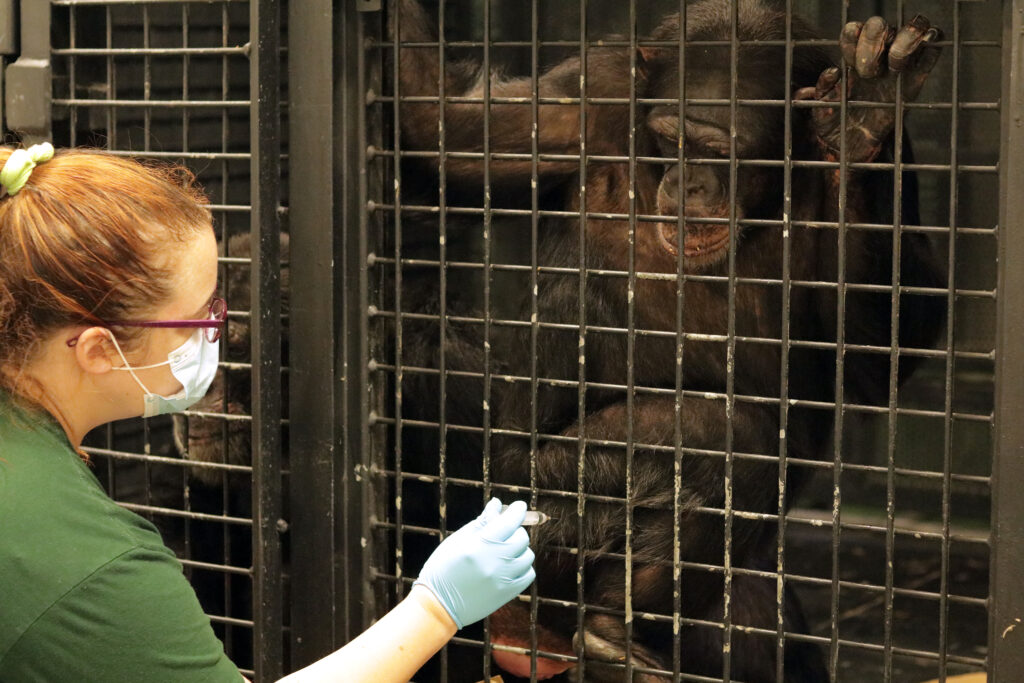
Covid Vaccines for the Chimps

By Kat West
Project Chimps is the first sanctuary to vaccinate chimps against Covid-19 with experimental covid vaccines developed by Zoetis, a veterinary medicine producer. This vaccine has been donated to zoos and sanctuaries across the country by Zoetis. Project Chimps, like other institutions requested these vaccines to protect the animals in their care. Approval comes from the USDA and the state veterinarian of Georgia as the vaccine gets approved on a case-by-case basis, hence why it’s considered experimental.
“We are proud to help the veterinary team at Project Chimps with a vaccine to help protect their chimpanzees from COVID-19,” said Mahesh Kumar, Ph.D, Senior Vice President, Global Biologics at Zoetis. “Based on our belief that healthier animals help create a healthier world, we are committed to use our expertise in animal health to help solve sustainability challenges facing animals and people. Specifically, we aspire to combat diseases that pose the greatest risk to animals and humans.”
Zoetis announced in early July it would donate more than 11,000 doses of its COVID-19 vaccine to help protect the health and well-being of more than 100 mammalian species living in nearly 70 zoos, as well as more than a dozen conservatories, sanctuaries, academic institutions and government organizations located in 27 states. The vaccine has been authorized for novel use on a case-by-case basis by the United States Department of Agriculture and appropriate state veterinarians.
Project Chimps has already started using the donated covid vaccine. So far, 19 chimps have participated in two “vaccine clinics” which are being set up once a week at the sanctuary. They will receive a booster shot three weeks after their first.
Some sanctuaries are choosing to not vaccinate their chimps and are comfortable with the steps they are taking, such as staff vaccines and the use of masks and social distancing. Still, many sanctuaries and zoos are taking the extra step of vaccinating their animals to give them the best chance of staying healthy. Read on to find out more about how Project Chimps is using vaccines to keep the chimps safe.
Why Vaccinate?
Ali Crumpacker, executive director of Project Chimps, tells Science, that zoos “went first and have seen no downsides”. The vaccine will protect the chimps from possible infection and improve their quality of life. Zoos that have vaccinated have seen no signs of adverse effects. On the other hand, unvaccinated animals, including apes, have caught Covid-19. Our veterinarian puts it this way: if we can prevent covid rather than have to treat it, that is the preferred route.
Getting sick isn’t good for anyone and that includes chimps.

Why are some against it?
Some critics are against using this experimental vaccine on former research animals. The chimps are retired from research but are getting an experimental vaccine, that sounds hypocritical when said out of context.
You might hear the above and think this means the chimps are being experimented on. That is not at all the case. Project Chimps veterinarian explains that before vaccines are FDA approved all vaccinations must be labeled as experimental. The research phase on vaccines like this is already concluded. Zoetis is not doing further research on the vaccines by donating the experimentally labeled version to facilities to use.
It’s important to remember the difference between experimental and experimenting. Project Chimps is not experimenting on the chimps. Even though it’s safe and effective the vaccine must be called experimental for legal reasons until it gets full FDA approval; this is the same process we have seen in the human vaccines used during the pandemic.
The chimps getting the vaccine will be observed for their response to ensure they do not suffer adverse effects, but this is different than research. They will receive the vaccine in either their arm or leg, whichever they chose to present when shown the syringe. Chimps that don’t volunteer for the vaccine will not be forced to receive it and may be vaccinated later if they change their mind.
The chimps will be given the vaccines when they are interested in cooperating with the behavior team’s request. As you can see in the video above, Harriett cooperates with the test syringe, receives her date, and then is injected by the real syringe. She definitely felt the difference, but it didn’t cause her to leave the area or mistrust the behaviorist. She still wanted her date.
What do these vaccines mean for the chimps?
Project Chimps is scheduling a vaccine clinic weekly until all the chimps have received both doses to fully protect them. Soon, they will all be protected against Covid-19 to prevent them from getting seriously sick. Primates and other animals in zoos have caught covid; even with staff being vaccinated there is a risk of transmission. However, the covid vaccine will help keep the chimpanzees at Project Chimps protected.
Project Chimps is taking every precaution to keep both chimps and staff safe. This includes staff vaccines, the use of social distancing and personal protective equipment (PPE). And now, covid vaccines for the chimps! With these measures in place everyone, chimps, and humans, at Project Chimps will be more protected against Covid-19.
You can help us continue to train the chimps to cooperate for their medical care by making a donation towards our behavior training program to help keep them healthy!

